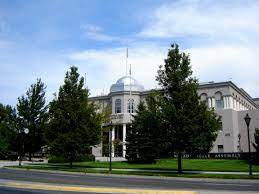
(Jon Styf) – The Nevada Legislature took no action on Wednesday after the Senate Committee of the Whole spent hours discussing the details of a bill that would give up to $380 million toward a stadium and entertainment development project to bring the Oakland Athletics to Las Vegas.
The bill is the focus of a Nevada Legislature special session that is estimated to cost the state $250,000 per day. The Senate is scheduled to meet again at 11:30 a.m. on Thursday.
Several senators pushed back after hearing a presentation from consultant Jeremy Aguero of Applied Analysis and Steve Hill, President of the Las Vegas Convention and Visitors Authority and their claims of the benefits of the estimated $1.5 billion project that will be built on nine acres of the current Tropicana Casino property after the casino is demolished.
The 30,000-seat stadium would be ready for the 2028 baseball season.
The bill is unchanged from a proposal heard in the regular legislative session that includes a tax capture at the complex expected not only to pay off up to $175 million in bonds but also to fund future capital projects at the stadium, which will be required by a “first-class” clause in a 30-year lease the Athletics plan to sign.
“We have these giant corporations that come in, billionaires that come in, and then we subsidize them with some tax abatement or tax program,” said Sen. Ira Hansen, R-Sparks. “Then, in the meantime, it’s the small businesses that have to make up the difference for the costs associated for the people employed in those things.
“… In the short term, in that 10-year window, someone has to make up for the tax revenues not being generated that is going into the general funds of various governments. So that’s where I think the small business community is being used to subsidize some corporate welfare for some big people who honestly should be able to finance their own projects without the need of the Nevada taxpayers.”
Aguero claimed that the taxes going into the stadium tax capture would all be new tax money since the stadium does not currently exist. But, the calculation doesn’t include the lost tax revenue and jobs from the Tropicana closing or that economists have shown spending at new sports stadiums is mainly diverted spending from elsewhere in a city or region, meaning it would have been spent on other entertainment options if they stadium was not built.
The tax capture will collect all sales, payroll, insurance, gross revenue, ticket and liquor taxes at the complex – planned to be built at the corner of Las Vegas Boulevard and Tropicana Avenue on the site of the current Tropicana Las Vegas Casino Resort – along with transportation taxes on trips to and from the complex. The Athletics will be able to sell stadium naming rights and keep those funds.
“We just finished a session and now we’re back here to consider a tax giveaway for a billionaire without concessions from the Athletics,” said Sen. Fabian Doñate, D-Las Vegas.
Aguero said that the financial, attendance and event numbers were calculated for his consulting company by Conventions, Sports and Leisure – owned by the New York Yankees and Dallas Cowboys – who provide numbers, often questioned by economists, to those looking for public funding for stadiums across the country.
Sen. Dallas Harris, D-Las Vegas, asked Aguero if the opportunity cost had been calculated for the project if the funding was spent elsewhere in the community and why 86% of economists disagree with professional sports stadium subsidies.
“There is nowhere else in the United States that has the level of visitor contributions that we have here,” Aguero said. “It is what sets us apart from everywhere else.”
Aguero said that economists are right that building stadiums in Des Moines, Iowa, and Tallahassee, Florida, with public funds would be net negative public spending. But he claimed Las Vegas is different.
J.C. Bradbury, an economist who has studied public subsidies at stadiums across the country, hears often about how particulars of a new proposal are different than the studies that have shown the true public cost.
“It’s time to stop merely disputing what paid economic consultants are presenting as being incorrect,” Bradbury wrote. “This conduct should be called out as completely unethical and morally reprehensible. This is going to cost Nevada taxpayers $400 million.”
Frank Stephenson, an economist from Berry College in Georgia, has studied the impact of stadiums and large events on hotel occupancy across the country. He believes that CSL and Aguero’s assumptions are inaccurate.
“LV hotel occupancy is already one of the highest among large markets so any new visitors that might be attracted would likely crowd out other visitors,” Stephenson wrote.
By


Facebook
Twitter
Pinterest
RSS